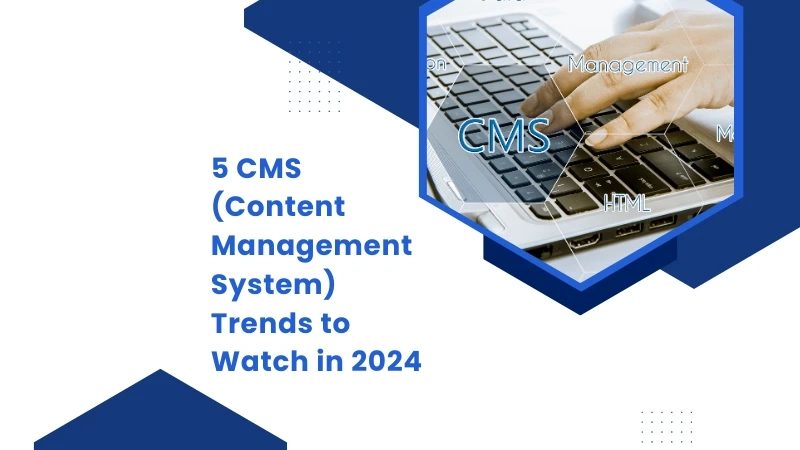In today's digital landscape, where content reigns supreme, businesses and organizations rely heavily on content management systems (CMS) to create, manage, and publish their online presence. As technology continues to evolve at a breakneck pace, the CMS industry is also undergoing rapid transformation, driven by changing user expectations, emerging technologies, and the ever-increasing demand for seamless digital experiences. As we approach 2024, it's essential for businesses and web professionals to stay ahead of the curve and anticipate the trends that will shape the future of content management systems.
Understanding these trends not only allows organizations to make informed decisions about their digital strategies but also empowers them to deliver exceptional content experiences that resonate with their audiences. In this blog post, we'll explore five groundbreaking CMS trends that are poised to revolutionize the industry in 2024. Whether you're a content creator, marketer, developer, or business owner, this blog post will provide invaluable insights into the future of CMS, enabling you to stay ahead of the competition.
Defining Content Management System (CMS)
A Content Management System (CMS) is a user-friendly digital platform that helps businesses create, organize, publish, and manage content across websites, apps, and digital channels. It simplifies content editing and doesn't require extensive technical skills. By bringing content management tasks together in one place, CMS platforms make workflows smoother, encourage teamwork, and ensure consistency online. They handle various content types, including text, images, videos, and interactive elements, making them crucial for digital content strategies. With customizable templates, strong security, and scalability, CMSs evolve alongside businesses, providing a flexible base for creating and improving digital experiences as needs change.
Key Trends in CMS Development 2024
In 2024, CMS (Content Management System) development continues to evolve, reflecting broader technological trends and user needs. Here are some key trends shaping CMS development in 2024:
1. Headless CMS & Decoupled Architecture
The concept of headless CMS, also known as decoupled architecture, has been gaining traction in recent years, and this trend is expected to accelerate in 2024. A headless CMS separates the content management system from the presentation layer, allowing developers to deliver content to multiple channels and devices seamlessly. With the rise of omnichannel experiences, businesses are seeking ways to create a consistent and cohesive presence across various touchpoints, including websites, mobile apps, and IoT devices. Headless CMS solutions provide the flexibility to distribute content to these diverse platforms, enabling organizations to future-proof their digital strategies.
2. Artificial Intelligence & Machine Learning Integration
Artificial Intelligence (AI) and Machine Learning (ML) technologies are poised to play a significant role in the CMS landscape in 2024. CMS vendors are actively exploring ways to integrate AI and ML capabilities into their platforms, offering enhanced features and functionalities. One area where AI and ML can significantly impact CMS is content personalization. By analyzing user behavior, preferences, and contextual data, AI-powered CMS solutions can deliver highly personalized content experiences tailored to individual users, increasing engagement and conversion rates. Additionally, AI and ML can streamline content creation and management processes. Features like automated content tagging, intelligent search, and content recommendations can save time and effort for content creators and editors, improving overall efficiency.
3. Emphasis on Omnichannel Content Delivery
In the digital age, users consume content across multiple devices and platforms, and businesses must adapt to provide seamless omnichannel experiences. In 2024, CMS solutions will continue to prioritize omnichannel content delivery, enabling organizations to publish and distribute content consistently across various channels. CMS platforms will focus on improving their capabilities to manage and deliver content to diverse channels, such as websites, mobile apps, social media platforms, and even virtual and augmented reality environments. This will involve enhancing content syndication, formatting, and optimization features to ensure optimal user experiences across different devices and platforms.
4. Increased Focus on Accessibility & Inclusivity
Accessibility and inclusivity have become crucial considerations in web development, and CMS platforms are taking note. In 2024, we can expect CMS vendors to place a stronger emphasis on features and tools that promote accessibility and inclusivity. This may include built-in accessibility checkers, tools for creating accessible content (e.g., alt text for images, closed captions for videos), and support for various assistive technologies. Additionally, CMS solutions may incorporate features that cater to different languages, cultures, and preferences, ensuring that content is inclusive and accessible to a diverse global audience.
5. Improved Developer Experience & Extensibility
While CMS solutions primarily cater to content creators and editors, the developer experience is equally important. In 2024, CMS vendors will continue to enhance the developer experience by providing robust APIs, extensible architectures, and seamless integration with modern web development frameworks and tools. Developers will benefit from improved documentation, better tooling, and streamlined workflows, enabling them to customize and extend CMS functionality more efficiently. Additionally, CMS platforms may introduce low-code or no-code features, empowering non-technical users to create and manage content without relying heavily on developers.
Wrapping Up
The landscape of CMS development is continuously evolving, driven by innovation and fueled by the ever-changing needs of businesses and consumers alike. As we look ahead to the trends shaping the CMS ecosystem, it's evident that the role of CMS platforms extends far beyond content management; they serve as catalysts for digital transformation and drivers of enhanced user experiences. For organizations seeking to harness the full potential of these trends, partnering with a reputable CMS development company is paramount. By leveraging the expertise and experience of a trusted CMS development partner, businesses can navigate the complexities of modern CMS technology with confidence, unlocking new opportunities for growth, engagement, and success in the digital realm.


